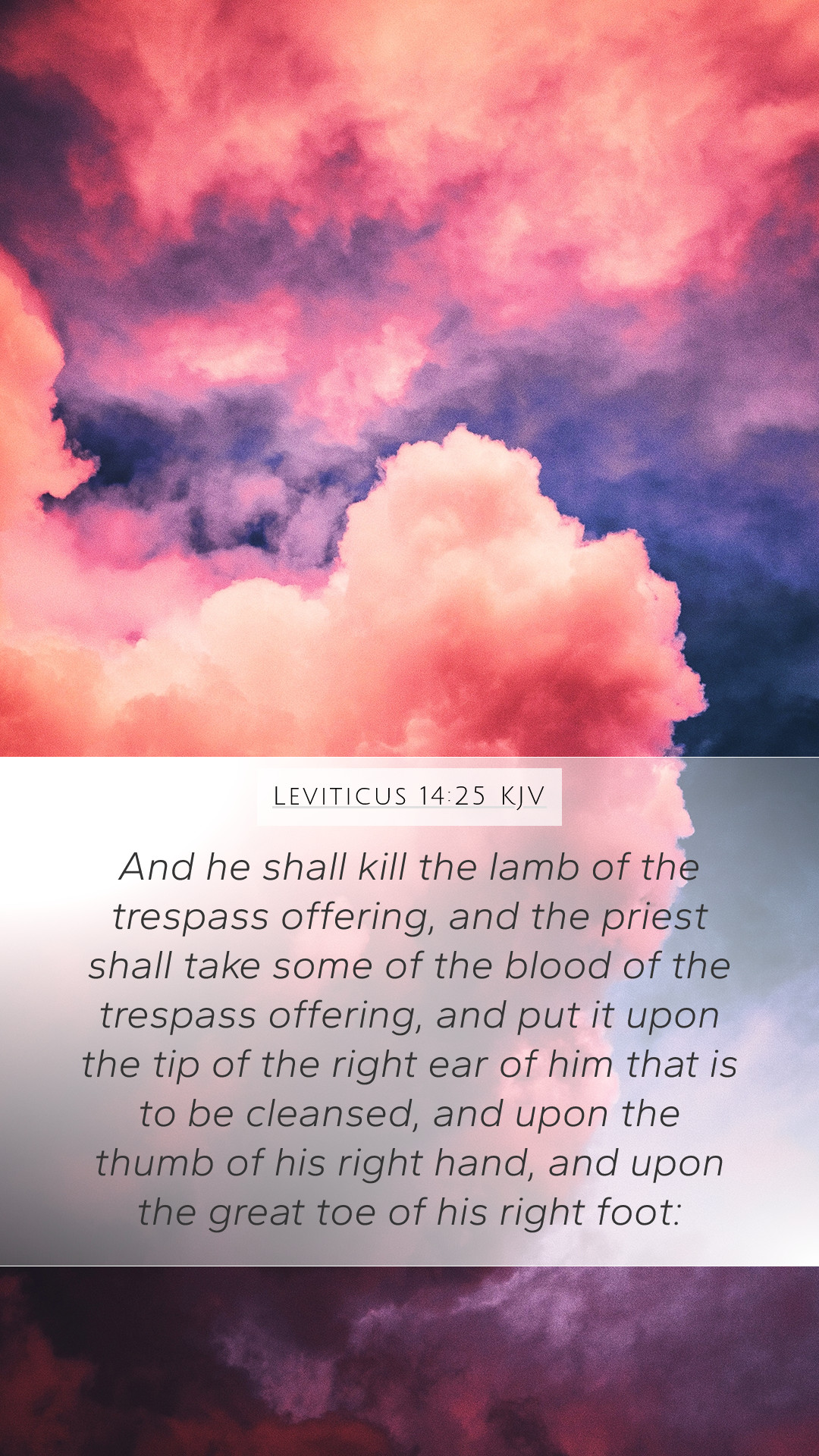Understanding Leviticus 14:25
Verse: "And he shall kill the lamb of the trespass offering, which is for the sin offering, in the place where they kill the burnt offering, and the priest shall take of the blood of the trespass offering, and put it upon the tip of the right ear of him that is to be cleansed, and upon the thumb of his right hand, and upon the great toe of his right foot." (Leviticus 14:25 KJV)
Overview
Leviticus 14:25 is part of the detailed instructions given to the Israelites regarding the ceremonial cleansing of a leper, demonstrating both the seriousness of sin and the means provided for restoration to community and worship. This verse highlights the sacrificial nature of atonement in the Old Testament and provides a glimpse into the broader themes of sin, sacrifice, and redemption.
Bible Verse Meaning
In interpreting this verse, it is essential to consider its context within the book of Leviticus, which primarily deals with holiness, law, and sacrificial practices.
1. The Nature of Trespass Offerings
Albert Barnes explains that the trespass offering is a type of sacrifice made to atone for unintentional sins or wrongs done to others. This offering highlights the principle of restoration that requires not just repentance but also the making right of wrongs.
2. The Role of the Priest
Matthew Henry emphasizes the role of the priest as a mediator between God and the people. In this verse, the priest's actions symbolize the spiritual cleansing that takes place through sacrifice. The priest’s ministry illustrates the need for an intercessor, a theme that finds its fulfillment in Jesus Christ in the New Testament.
3. Consecration and Signs of Cleansing
According to Adam Clarke, the application of blood to the ear, thumb, and toe signifies the dedication of the whole person to the Lord's service. It symbolizes that one’s hearing, actions, and way of life should reflect a life consecrated to God.
Application and Significance
This verse holds significant meaning not only for the Israelites of ancient times but also for Christians today. It speaks to the gravity of sin and God's provision for cleansing and restoration. Understanding Scripture, especially difficult Bible passages such as Leviticus, is critical in comprehending the sacrificial system that underpins many biblical themes.
Applying the Teachings
- Bible Study Insights: This verse can be a focal point in Bible study groups, prompting discussions about the nature of sin and the requirement for sacrifice in the path to redemption.
- Biblical Exegesis: By examining the rituals in Leviticus, we gain insight into God's holiness and the seriousness with which He views sin.
- Online Bible Study: Utilizing Bible study tools, one can explore various interpretations and applications of this verse, enriching one's understanding of Scripture.
Related Bible Cross References
- Exodus 29:20-21: Instructions for consecrating the priests with blood.
- Hebrews 9:22: The principle that without the shedding of blood, there is no remission of sin.
- Leviticus 4:6: The priest shall dip his finger in the blood and sprinkle it before the Lord.
- Isaiah 53:5: The prophetic significance of Christ's suffering for our transgressions.
Conclusion
Leviticus 14:25 serves as a rich verse for understanding the depth of the sacrificial system and its implications for sin and cleansing. Through careful Bible verse commentary, scripture analysis, and biblical exegesis, profound lessons can be drawn for both personal application and corporate worship. The understanding of such verses informs our Bible study lessons and enriches our relationship with God, reminding us of His grace and the ultimate sacrifice made through Jesus Christ.


